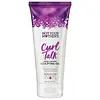What's inside
What's inside
 Benefits
Benefits

 Concerns
Concerns

 Ingredients Side-by-side
Ingredients Side-by-side

Water
Skin ConditioningGlycerin
HumectantVp/Va Copolymer
Propanediol
SolventPvp
Emulsion StabilisingPEG-40 Hydrogenated Castor Oil
EmulsifyingLactobacillus/Tomato Fruit Ferment Extract
Skin ConditioningOryza Sativa Extract
AbsorbentKeratin Amino Acids
Skin ConditioningLeuconostoc/Radish Root Ferment Filtrate
AntimicrobialAcyl Coenzyme A Desaturase
Skin ConditioningCarbomer
Emulsion StabilisingParfum
MaskingDisodium EDTA
Phenoxyethanol
PreservativeEthylhexylglycerin
Skin ConditioningSodium Hydroxide
BufferingWater, Glycerin, Vp/Va Copolymer, Propanediol, Pvp, PEG-40 Hydrogenated Castor Oil, Lactobacillus/Tomato Fruit Ferment Extract, Oryza Sativa Extract, Keratin Amino Acids, Leuconostoc/Radish Root Ferment Filtrate, Acyl Coenzyme A Desaturase, Carbomer, Parfum, Disodium EDTA, Phenoxyethanol, Ethylhexylglycerin, Sodium Hydroxide
Water
Skin ConditioningPolyquaternium-69
Glycerin
HumectantPEG-40 Hydrogenated Castor Oil
EmulsifyingHumulus Lupulus Extract
AntimicrobialJasminum Officinale Flower Extract
MaskingCitrus Limon Peel Extract
EmollientCarbomer
Emulsion StabilisingEthylhexylglycerin
Skin ConditioningDisodium EDTA
Butylene Glycol
HumectantAminomethyl Propanol
BufferingSodium Benzoate
MaskingPhenoxyethanol
PreservativeIodopropynyl Butylcarbamate
PreservativeWater, Polyquaternium-69, Glycerin, PEG-40 Hydrogenated Castor Oil, Humulus Lupulus Extract, Jasminum Officinale Flower Extract, Citrus Limon Peel Extract, Carbomer, Ethylhexylglycerin, Disodium EDTA, Butylene Glycol, Aminomethyl Propanol, Sodium Benzoate, Phenoxyethanol, Iodopropynyl Butylcarbamate
Ingredients Explained
These ingredients are found in both products.
Ingredients higher up in an ingredient list are typically present in a larger amount.
Carbomer is a polymer of acrylic acid. Its main role is to create a gel consistency.
A high amount of carbomer can cause pilling or balling up of products. Don't worry, most products contain 1% or less of carbomer.
Disodium EDTA plays a role in making products more stable by aiding other preservatives.
It is a chelating agent, meaning it neutralizes metal ions that may be found in a product.
Disodium EDTA is a salt of edetic acid and is found to be safe in cosmetic ingredients.
Learn more about Disodium EDTAEthylhexylglycerin (we can't pronounce this either) is commonly used as a preservative and skin softener. It is derived from glyceryl.
You might see Ethylhexylglycerin often paired with other preservatives such as phenoxyethanol. Ethylhexylglycerin has been found to increase the effectiveness of these other preservatives.
Glycerin is already naturally found in your skin. It helps moisturize and protect your skin.
A study from 2016 found glycerin to be more effective as a humectant than AHAs and hyaluronic acid.
As a humectant, it helps the skin stay hydrated by pulling moisture to your skin. The low molecular weight of glycerin allows it to pull moisture into the deeper layers of your skin.
Hydrated skin improves your skin barrier; Your skin barrier helps protect against irritants and bacteria.
Glycerin has also been found to have antimicrobial and antiviral properties. Due to these properties, glycerin is often used in wound and burn treatments.
In cosmetics, glycerin is usually derived from plants such as soybean or palm. However, it can also be sourced from animals, such as tallow or animal fat.
This ingredient is organic, colorless, odorless, and non-toxic.
Glycerin is the name for this ingredient in American English. British English uses Glycerol/Glycerine.
Learn more about GlycerinPeg-40 Hydrogenated Castor Oil is derived from castor oil and polyethylene glycol (PEG). It is used as a emollient and emulsifier.
As an emulsifier, it helps prevent ingredients from separating. It also helps make the other ingredients more soluble; it is often used to solubilize fragrances. This increases spreadability and elongates shelf life in a product.
Emollients help soothe and soften the skin. They do this by creating a protective film on your skin. This barrier helps trap moisture and keeps your skin hydrated. Emollients may be effective at treating dry or itchy skin.
This ingredient may or may not be vegan, depending on the source.
Peg-40 Hydrogenated Castor Oil may not be fungal-acne safe. We recommend speaking with a professional if you have any questions or concerns.
Learn more about PEG-40 Hydrogenated Castor OilPhenoxyethanol is a preservative that has germicide, antimicrobial, and aromatic properties. Studies show that phenoxyethanol can prevent microbial growth. By itself, it has a scent that is similar to that of a rose.
It's often used in formulations along with Caprylyl Glycol to preserve the shelf life of products.
Water. It's the most common cosmetic ingredient of all. You'll usually see it at the top of ingredient lists, meaning that it makes up the largest part of the product.
So why is it so popular? Water most often acts as a solvent - this means that it helps dissolve other ingredients into the formulation.
You'll also recognize water as that liquid we all need to stay alive. If you see this, drink a glass of water. Stay hydrated!
Learn more about Water